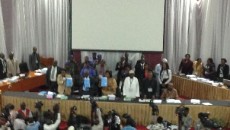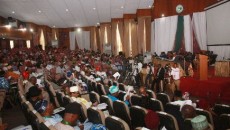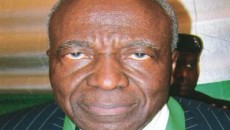The National Conference has just concluded its third week of sitting. Well thus far what has happened? What are the emerging trends? And what can we begin to deduce as the shape of things to come?
What is becoming quite clear is the intensification of the class struggle within the conference; and this intensification is happening despite the apparent calmness of proceedings during the third week.
The firs onslaught was launched by the alliance of the old guard of the ruling elites through the instrumentation of the committee of 50 persons [the so-called friends of the chairman], with the active participation of the conference leadership.
A committee which was set up [itself without consultation with the delegations, a fact that was pointed out and protested] to try to resolve the impasse around what should constitute a majority of votes in the absence of a consensus, went beyond its brief to propose the reversal of a unanimous decision of conference in plenary of 24th March.
What were the issues at stake? The committee of 50 [less than 10% of the delegates] came back with the recommendation of 70% majority vote in the absence of a consensus. This was within its ambit and terms of reference, and this was adopted by the whole conference as a reasonable consensus. For those of us who had insisted on two-thirds, it was victory, as 70% is closer to two-thirds than it is to 75%; nevertheless, for both sides it represented a concession.
However the committee also went outside the limits of its terms of reference and recommended the reversal of conference decision a week earlier to the effect those committees would elect their own presiding officers. The committee of 50 instead recommended that this be reversed so that the conference leadership would be the ones to select the presiding officers of the committees.
This was moved as a motion, which was then countered by a counter motion which described this attempt to reverse conference earlier decision a subversion of the popular will of delegates. The Conference presiding officers took exception to the charge of subversion, and became defensive. The motions were then put to a vote in a very ambiguous manner that ended in an ambush to wit, many delegates voted for the motion to reverse thinking they were voting for the motion to retain the original decision of the conference.
Once this subterfuge was detected, the Civil Society and Labour delegations protested the subversion of democracy, addressed petitions to the conference secretariat and subsequently addressed a joint press conference. This subterfuge became necessary, and was desperately put into action, because the ruling elites felt they were beginning to lose control over the conference.
Furthermore in the course of week three, the first joint meeting of the Labour and Civil Society Delegations was held, with a resolution to collaborate all through the conference, jointly build alliances, and develop a minimum program of action for the joint platform.
And just as the delegations of Civil Society, Labour and other progressive delegates were concluding a common platform for collaboration, the old guard of the ruling class were also inaugurating their own alliance platform – the National Unity Forum. The stage is now set for major battles between these two platforms.
This was also the week when delegates began to make their respective opening statements, meant to both respond to the President’s inaugural address, as well as announces a summary of the issues and demands being brought to the conference by delegates.
Conference had initially agreed that each delegate will get to speak for 3 minutes for this purpose. The Civil Society Delegation as well as the Labour Delegation had jointly agreed to use the opportunity to redirect discourse at the conference from ethno-religious cleavages to socio-economic and political issues.
Not only did we expose the lie of the elite concerning the North-South, Christian-Muslim Dichotomies as the bane of our problems, we also exposed and indicted the ruling elites for their active roles in bringing us as a nation to this pass.
We were clear in stating that ordinary citizens 100 years after the amalgamation have become more than the mere arithmetic sum of our ethnic and or religious groupings; that the existential challenge that confront us are mass poverty, mass unemployment, mass inequality, mass homelessness, that drives citizens into misery, alienates the majority, and gets them angry at society.
And for the avoidance of doubt, the major threat that confronts us is not ethnic, it is not religious, it is not regional; rather it is CLASS; the widening gap between the rich and the poor, driven by ruling class greed, and propelled by ruling class corruption and propensity to pillage our collective treasury. This widening gap between the rich and the poor, one of the widest in the world, is demonstrated by the fact that the top 10% of wealthy citizens own 40% of national wealth, while the bottom 20% of citizens, who are impoverished own only 4.1% of national wealth. It is this that makes class exploitation the main problem that must be confronted; and it is why the major demand we are making is for a Social Charter; one that includes a comprehensive bill of rights that is justiceable, actionable, and enforceable.
This was our proclamation from the conference tribune during its third week. And with the proclamation we announced our intention to wage a class battle within the conference during and after its sittings.
And as if to underline our position the World Bank just announced in its most recent report released during the week, that Nigeria is one of the poorest countries in the world, despite its wealth in natural resources.



